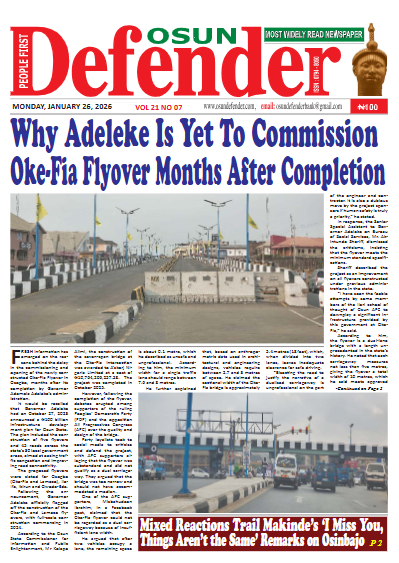Osun To Get 75 Truckloads Of Fertiliser To Curb Food Crisis

The Osun State Government is set to receive 60 truckloads of fertiliser from the Federal Government as part of efforts to address the lingering food crisis in the country.
Also, the three senators representing the state at the red chamber will get two trucks of fertiliser to be distributed to farmers while the nine House of Representatives members will get one truck each.
The plan was discussed during a debate on the biting food crisis plaguing the nation at the floor of the Senate, on Tuesday.
The Senate at the session called on the Federal Government to expedite action on fertiliser distribution.
The call followed a motion moved by Senator Sunday Karimi, representing Kogi West, and co-sponsored by Senator Ali Ndume from Borno South at the plenary.
Karimi, in the motion titled, “Urgent Need to Address Food Insecurity and Market Exploitation of Consumables In Nigeria,” noted that in the last few months, the prices of goods and household consumables had skyrocketed on an abysmal rise in the country, leading to a high rate of inflation, weakened purchasing power, thus resulting in general worsening of living conditions of the vast majority of Nigerians.
READ: How I Was Abducted, Shot During Protest – Osun Transport C’ttee Chairman
He further noted that the latest data released by Nigeria’s National Bureau of Statistics showed that “food inflation in the country skyrocketed to 40.66 per cent on a year-on-year basis, a significant increase from the 24.82 per cent recorded in May 2023.
“The current market price of food items such as beans, maize, rice paddy, yam, tomatoes, and onions, which initially rose by about 40 per cent after the removal of petroleum subsidy, has now increased by over 100 – 300 per cent without any attributable reasons for the increase in prices.”
He added, “Although insecurity in food-producing regions, bad roads, increase in the cost of transportation attributable to the removal of fuel subsidy and depreciation of the value of naira are possible factors that have contributed to the increase in price of food items, household commodities, and consumables; the percentage of increase in cost of transportation and some other factors listed above is significantly less than the percentage increase in the current prices of goods all ever the country.”
All efforts made by the Federal Government to arrest the consistent increase in food inflation had not yielded the desired results, according to Karimi.
Senator Ndume, in his contribution, lamented that this is the first time Nigeria was listed as one of the countries battling food insecurity.
He said, “Currently there are four countries, including Sudan and some others, that are facing very serious insecurity. Nigeria is added to this list this year by the International Rescue Committee as one of the spots for food insecurity action against hunger. World Food Programme also indicated that over 32 million people are expected to face a critical hunger crisis at emerging levels between now and August.
“I don’t know about some other colleagues, but here in the North, we have started seeing it visibly. This is the first time we are experiencing this level of hunger. It’s the first time Nigeria is being listed as one of the countries with food insecurity.”

Kazeem Badmus is a graduate of Mass Communication with years of experience. A professional in journalism and media writing, Kazeem prioritses accuracy and factual reportage of issues. He is also a dexterous finder of the truth with conscious delivery of unbiased and development oriented stories.








